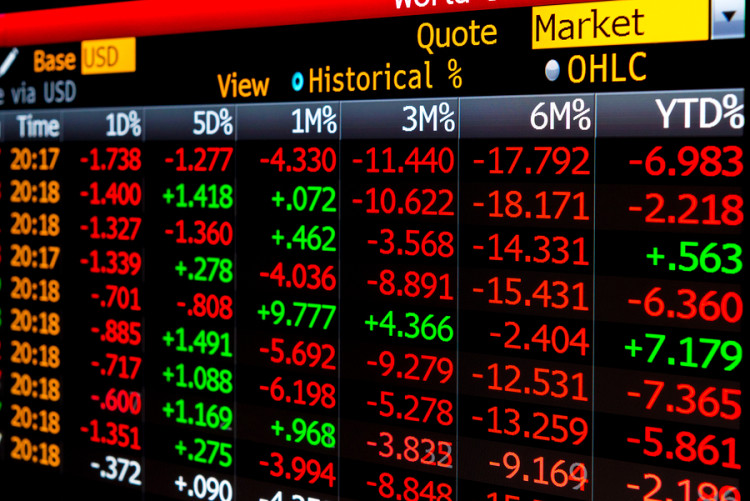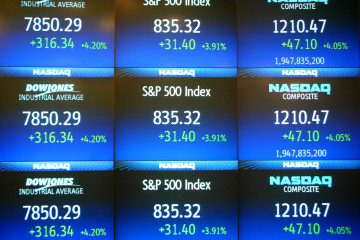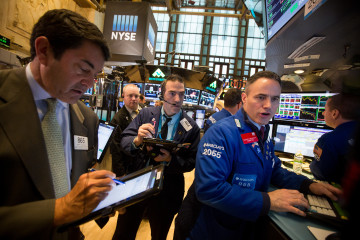U.S. Stocks Decline After S&P 500’s Longest Rally Since October

©2016 Bloomberg News
O3QM5F6K50Y8
(Bloomberg) — U.S. stocks retreated from nine-week highs after worsening economic data from Asia reignited concern over the outlook for global growth.
The Standard & Poor’s 500 Index was on track to halt its longest winning streak in five months as commodity shares and banks, pillars of the market’s recent gains, paced declines. JetBlue Airways Corp. tumbled 8.4 percent to lead airlines lower after a forecast on a measure of its revenue disappointed. Urban Outfitters Inc. jumped the most in more than three years after its quarterly profit topped estimates.
The S&P 500 dropped 0.9 percent to 1,983.94 at 3:25 p.m. in New York, on track for its first decline in March. The Dow Jones Industrial Average fell 71.99 points, or 0.4 percent, to 17,001.96 after nearly erasing a 152-point drop. The Nasdaq 100 Index slipped 0.5 percent, while the Russell 2000 Index declined 1.9 percent. Energy companies in the small-cap measure tumbled 7.4 percent, the most six weeks. Trading volume in S&P 500 shares was 16 percent below the 30-day average for this time of day.
“You have to consider China data coming in the way it did because then you have a potential for the global slowdown, but that’s a story that’s pretty well understood,” said Yousef Abbasi, global market strategist at JonesTrading Institutional Services LLC in New York. “We’re digesting this steady move up we’ve had that hasn’t really had a bout of risk-off considering it was a huge bounce off the bottom. A lot of people are looking out to the ECB and one comment from Draghi could bring us into risk-off.”
Equities fell Tuesday as data showed Japan’s economy and Chinese exports are shrinking, reviving anxiety that monetary policy won’t be enough to support global economy. The declines also come after the S&P 500’s best three-week stretch since 2014, as investors reined in risk-taking before gatherings of central bankers in Europe and the U.S.
Energy producers in the benchmark slid with crude, down 3.9 percent and headed for the biggest drop since Jan. 25 after a 14 percent gain during the past three weeks. Banks fell for a second session after halting a four-day advance Monday, a sign that momentum in the group was slowing following a 15 percent rebound from nearly three-year lows. Apache Corp. and Transocean Ltd. sank at least 9.1 percent, while Citigroup Inc. decreased 3.3 percent.
Investors are looking to Thursday’s European Central Bank policy update, and next week’s Federal Reserve gathering for indications of the trajectory of interest rates and potential for further stimulus. Speculation for additional moves from the ECB to boost growth, along with nascent stability in crude prices and improving U.S. data have helped global equities rebound during the past three weeks.
Rate Bets
Traders are pricing in a less than one-in-10 chance the Fed will raise borrowing costs this month. Odds for a September move have risen to about 56 percent from less than 35 percent two weeks ago, though the probability slipped from 59 percent yesterday following the data from China and Japan.
The S&P 500’s 9.4 percent rally through Monday since a low last month pushed it to a nine-week high and trimmed its loss this year to just 2.1 percent. It trades at 16.6 times this year’s projected earnings, up from a two-year low of 15.2 in February. Still, that’s about 7 percent below the 18.1 peak reached last April.
“After three weeks of gains, we’re getting a bit of profit- taking triggered by the not-so-nice economic figures out of Asia,” said Heinz-Gerd Sonnenschein, a strategist at Deutsche Postbank AG in Bonn, Germany. “Oil has helped push markets up and we’re lacking that catalyst today. It’s also a question of pausing and waiting to hear from Draghi this week and the Fed soon after.”
The Chicago Board Options Exchange Volatility Index rose 7 percent Tuesday to 18.57, climbing for a third day for the first time in nearly a month. The measure of market turbulence known as the VIX had lost 40 percent during the S&P 500’s three consecutive weeks of gains through Friday.
Role Reversal
Some of the biggest winners since the market touched a low on Feb. 11 reversed course. Financial, materials and energy stocks, three of the top four performers in the S&P 500 since then, led the benchmark gauge lower Tuesday with declines of at least 1.5 percent. Investors instead turned to defensive shares that have been the best performers in 2016, as utilities and consumer staples added at least 0.4 percent.
Banks that made the biggest comebacks from lows last month were among the hardest hit today. Comerica Inc. lost 3.9 percent after a 23 percent jump in the last three weeks, while Bank of America Corp. sank 3.1 percent after a 21 percent run-up.
Ford Motor Co. and General Motors Co. retreated more than 2.7 percent. Retail auto sales in China fell 3.7 percent in February from a year ago, the Passenger Car Association said on its website. Auto and parts makers in the S&P 500 have been the strongest performers since Feb. 11 among 24 industry groups in the benchmark, rising more than 18 percent through Monday.
Technology companies slipped, despite buyers returning to shares that sold off yesterday. Microsoft Corp. rose 1.5 percent, reversing most of a drop on Monday, while Facebook Inc. added 0.5 percent to recover a portion of its 2.5 percent slide yesterday. Those gains were overshadowed by declines in semiconductors, which were also strong performers during the recent rally. Micron Technology Inc. and Skyworks Solutions Inc. dropped at least 3.9 percent.
Consumer Staples
Consumer staples shares were on their way to reversing much of Monday’s decline, boosted by drugstore chains Walgreens Boots Alliance Inc. and CVS Health Corp., which increased at least 1 percent. Costco Wholesale Corp. gained 2 percent to rise for the first time in four days.
Retailers advanced, led by Urban Outfitters’ 16 percent jump. Home Depot Inc. gained 1.5 percent, on track for the most in three weeks, to help the Dow trim its decline. Netflix Inc. increased 0.9 percent after losing more than 6 percent yesterday, its worst drop in a month.
Among shares moving on corporate news, Sun Edison Inc. rose 5.8 percent, trimming gains of more than 33 percent, after its $1.9 billion deal to acquire Vivint Solar Inc. was canceled by the target. The move is a relief to Sun Edison shareholders who balked at a plan to pay a 52 percent premium for Vivint and raised concerns about the amount of debt the company had taken on.
Shake Shack Inc. fell 11 percent, the most in four weeks, after slowing growth raised concerns about the burger chain’s lofty valuation. The company expects same-store sales to rise 2.5 percent to 3 percent in 2016, according to a statement on Monday. That compares with an increase of 13.3 percent in 2015.
–With assistance from Sofia Horta e Costa.
To contact the reporter on this story: Oliver Renick in New York at orenick2@bloomberg.net To contact the editors responsible for this story: Cecile Vannucci at cvannucci1@bloomberg.net John Shipman






No Comment